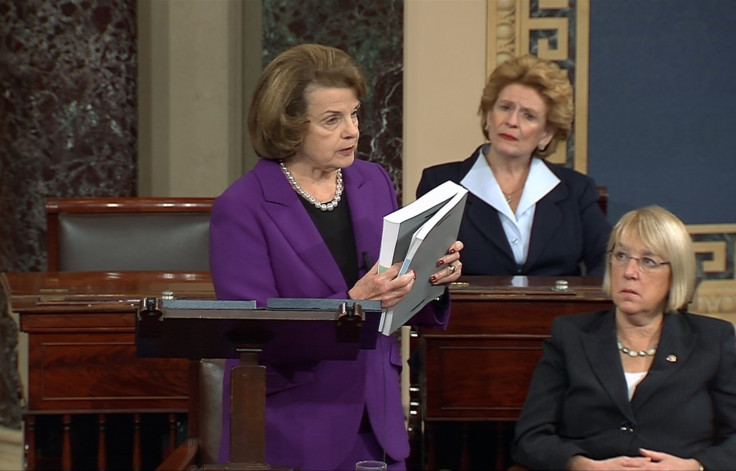CIA Torture Report: Feinstein, McCain Say Agency's Enhanced Interrogation Techniques Did Not Work

The Senate Intelligence Committee released on Tuesday a damning report on CIA interrogation practices in the wake of the 9/11 attacks, which found among others one thing: That torture did not work. Committee Chairman Dianne Feinstein said in presenting the report that “enhanced interrogation techniques were not effective.”
The report made it clear that the Central Intelligence Agency was guilty of using brutal interrogation techniques violating U.S. law and treaty obligations, without ever obtaining meaningful information.
The heavily redacted report, which was reduced from 6,000 pages to 600 pages for release, has already resulted in the CIA defending its position, saying that the program of enhanced interrogation techniques was “effective” and greatly helped its own understanding of al-Qaeda’s tactics and ambitions.
But evidence in the report (full text here) outlined multiple occasions in which the CIA misled senior government officials about the effectiveness of the techniques. For example, the CIA claimed in a March 2005 report that Abu Zubaydah, a Saudi man believed to be highly placed in al Qaeda, provided information on what is known as the “Dirty Bomb Plot” after being subject to torture tactics. However, as the report outlines, “the information outlined by the CIA was inaccurate” and the suspect provided the same information to FBI officers prior to the CIA interrogation using rapport-building interrogation techniques, rather than torture.
But perhaps the most famous example of a high profile success and justification for enhanced interrogation techniques was the raid that led U.S. Special Forces to Osama Bin Laden. The CIA claimed that it was through "enhanced interrogation," which included subjecting a captive named Hassan Ghul to sleep deprivation and stress positions, that led special forces to Osama Bin-Laden. Yet according to the report, the enhanced techniques provided “no actionable threat information.” The report says that it was information that Ghul willingly gave investigators that led them to discover Bin Laden and not the torture. One investigator said that Ghul “sang like a tweetie bird” as he gave investigators the information they needed.
Backing up Feinstein’s comments during the hearing was Republican Senator John McCain, a longtime critic of torture, who said that the CIA’s actions had “stained our national honor” before drawing on his own personal experience as a tortured prisoner of war in Vietnam for five and half years. He said: "Under torture a person will say anything he thinks his captors want to hear — true or false — if he believes it will relieve his suffering.”
However, it's not as if the CIA were unaware that such tactics were not effective. In 1989, the agency determined for itself after engaging with coercive interrogations, that such techniques "do not produce intelligence," and "will probably result in false answers," and had historically proven to be ineffective. But after 9/11, these conclusions were ignored, and in November 2001, a memo from CIA lawyers said that the techniques would be far more acceptable if it was thought they could save lives.
In an undated email from a name that has been redacted on the report, the author writes that “It is our assessment that if CIA loses the ability to interrogate and use enhanced measures in a responsible way, we will not be able to effectively prosecute this war” and that “detainee information has saved countless American lives inside the US and abroad.”
In defense of the CIA's actions, Jose Rodriguez, former head of the CIA clandestine services, wrote in an op-ed for the Washington Post Dec. 5 that Feinstein was one of many who in 2002 supported radical action to prevent further terror attacks. She said that it would no longer be "business as usual" and that the terror "threat is profound” and “that we have to do some things that historically we have not wanted to do to protect ourselves.”
© Copyright IBTimes 2025. All rights reserved.






















